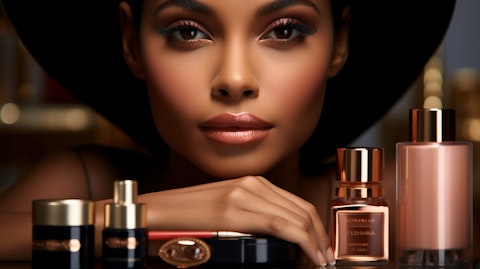We recently compiled a list of the 10 Best Beauty Stocks To Buy According to Short Sellers. In this article, we are going to take a look at where Coty Inc. (NYSE:COTY) stands against the other beauty stocks.
The US beauty market, which is seeing major shifts in distribution and customer interaction, continues to be a key area of interest for stakeholders. Beautymatter CEO Kelly Kovack underlined that consumer-driven channels have replaced traditional distribution strategies, compelling companies to engage with customers wherever and whenever they’re most comfortable.
According to a report, the US beauty market is expected to grow to $114 billion by 2027. On the other hand, the prestige channel saw its third straight year of double-digit growth in 2023, rising by 14% to $31.7 billion, outpacing the mainstream market across make-up, skincare, hair, and fragrance, according to the February 2024 CEW conducted annual “Global Trend Report” virtual event. Luxury brands represent the fastest-growing segment, with sales surpassing $16 billion, although being smaller at 11% of the market.
Bigelow Trading’s Daina Nadler emphasized the value of multichannel distribution plans that are customized to a wide range of consumer buying preferences. According to John Cafarelli, CEO of Beautymatter, 87% of US beauty lovers prefer in-store shopping, and 80% of them frequent stores that specialize in beauty products. In-store shopping continues to be popular. In order to increase traffic and loyalty, Space NK’s Noah Rosenblatt and H-E-B’s Jeanne Tamayo stressed the significance of creating compelling retail spaces and solid brand-consumer relationships.
In contrast, although offline retail in China is declining by 4%, e-commerce and social commerce, particularly Douyin, are growing at 9% and 57%, respectively, according to Nielsen IQ. China is a resilient beauty market, and despite all of the difficulties following the pandemic, it remains the world’s second-largest beauty market, posing numerous challenges for international suppliers notes Vice President of Nielsen IQ Gautam Seth. He also points out that local companies are more successful because they employ local ingredients and have a strong cultural connection. Industry giants like Jina Lee of Urang and Kim Da Jeong of Lotte Department Store have stressed the importance of consumer knowledge about ingredients and product efficacy.
The emphasis on diversity is also influencing the global beauty market, although many individuals continue to feel underrepresented in health and beauty advertisements as per Circana. Expectations from consumers about varied representation in terms of gender, color, age, ability, body size, and sexual orientation are at an all-time high. A general market and a multicultural market will not differ by 2044 due to the majority-minority population in the United States. According to a study by SeeMe Index and Circana, brands that are certified inclusive grow 1.5 times faster than brands that are not. Additionally, the likelihood of seeing individuals over 55 in these brands’ advertisements who equally represent straight and homosexual partnerships is 2.5 times higher than that of less inclusive brands, which are 12 times more likely to just feature straight relationships.
Looking ahead, the global beauty market is expected to generate retail sales of over $580 billion by 2027, with an annual growth rate of 6% per report.
One area gaining attention and stimulating beauty business is the growing consumer interest in wellness within beauty. According to a survey on wellness trends in 2024, 82% of US consumers, 87% of Chinese consumers, and 73% of British consumers now rank wellness as a top or important priority in their daily lives. The Goop, one of the “Most Successful Celebrity Beauty Companies in the World,” philosophy is that “beauty is wellness and wellness is beauty.” Beauty firms are entering this space. A massive beauty brand and the Stanford Institute on Longevity have teamed up to develop a new age-reversal technology-powered product.
Methodology:
We sifted through holdings of beauty ETFs and online rankings to form an initial list of 20 beauty stocks. Then we selected the 10 stocks that had the lowest percentage of their shares shorted. The stocks are ranked in ascending order of the lowest percentage of their shares shorted.
Why are we interested in the stocks that hedge funds pile into? The reason is simple: our research has shown that we can outperform the market by imitating the top stock picks of the best hedge funds. Our quarterly newsletter’s strategy selects 14 small-cap and large-cap stocks every quarter and has returned 275% since May 2014, beating its benchmark by 150 percentage points. (see more details here)

A close-up of a woman’s face wearing a beauty product, highlighting the company’s range of luxury items.
Coty Inc. (NYSE:COTY)
% of shares shorted: 1.55%
Global beauty manufacturer Coty Inc. (NYSE:COTY) concentrates mostly on color cosmetics (28%) and fragrances (59%), with limited exposure to skincare (5%) and body care (5% of sales). The company’s consumer cosmetics business is centered on acquired mass brands including Rimmel, CoverGirl, Max Factor, Sally Hansen, and Bourjois; for its fragrance business, it licenses luxury and high-end labels like Gucci, Burberry, Hugo Boss, Davidoff, and Calvin Klein.
Furthermore, Coty, one of the “Biggest Skincare Companies in the US,” launches makeup items using the names of social media stars Kim Kardashian and Kylie Jenner in partnership with them.
Recently, the firm revealed that it has signed a long-term license agreement with German model and television presenter Lena Gercke to develop, produce, and distribute her first fragrance. Thus, expanding and enhancing its business segment through the introduction of new products, labels, and technological advancements have led to this partnership.
Nearly 44% of the beauty company’s revenues come from Europe, 42% from the Americas, and 14% from Asia-Pacific, according to the region. JAB, a German investment firm, holds a controlling 53% stake.
Since taking over as CEO in 2020, Sue Nabi has brought Coty Inc. (NYSE:COTY) into better health by maintaining cost control, revitalizing the company’s brand promotion, and sharpening its focus on innovation with her 20 years of experience in the beauty industry. As a result, after the pandemic lows, both sales growth and profitability grew. The sales grew by 32.14% since pandemic lows.
Having said that, some analysts are still trying to convince that Coty has created an economic moat due to its lack of brand strength, insufficient connections with retailers, and small revenue base in comparison to its powerful global competitors, L’Oreal and Estee Lauder.
However, the beauty giant’s share price increased by 6% after Q2 2024 due to optimism in the premium fragrance market (which accounts for two-thirds of Coty sales) and management’s focus on innovation.
Following the company’s Q2 2024 results, which showed 10% YoY growth in sales to $6.1 billion and a 12% increase in adjusted EBITDA to $1.1 billion, in line with expectations, Morningstar analysts retain a price target of $11.40 for the company. In line with management’s projections, it estimates $6.6 billion in revenue (up 7.4%) and $1.2 billion in adjusted EBITDA (up 9%) for 2025.
Notwithstanding obstacles, Coty’s net revenue has increased over the last three years due to rising profit margins and expansion in the mass market and prestige beauty segment. The growth of the prestige channel exceeded that of the mass market in 2023, which prompted Coty to concentrate on developing a solid lineup in the prestige cosmetics market.
Hence, analysts are bullish on the stock and have given it a “Buy” rating. The average 12-month price objective set by the 13 analysts for Coty Inc. (NYSE:COTY) stock is $12.85, which is a 36.99% increase from the stock’s current price of $9.38.
The company has hedge fund sentiments of 23 in Q2 2024. Steve Cohen’s Point72 Asset Management is the largest shareholder in the company, with 5,582,064 shares worth $55.93 million.
Overall COTY ranks 6th on our list of the best beauty stocks to buy according to short sellers. While we acknowledge the potential of COTY as an investment, our conviction lies in the belief that some AI stocks hold greater promise for delivering higher returns, and doing so within a shorter time frame. If you are looking for an AI stock that is more promising than COTY but that trades at less than 5 times its earnings, check out our report about the cheapest AI stock.
READ NEXT: $30 Trillion Opportunity: 15 Best Humanoid Robot Stocks to Buy According to Morgan Stanley and Jim Cramer Says NVIDIA ‘Has Become A Wasteland’.
Disclosure: None. This article is originally published at Insider Monkey.





